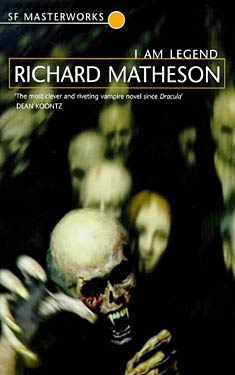Richard
Matheson
Completed 9/14/2018,
Reviewed 9/14/2018
5 stars
I first read
this book in college, during summer break.
I really loved it, but it was so long ago, I didn’t remember it. Upon second reading, it’s hard to imagine the
book without thinking about one or several of the movie versions coming to
mind. In a way, it’s fortunate that the
two movie versions I saw were not like the book, because it allowed me to have
a new experience of the book. To me, the
book was about surviving amidst despair and hopelessness. It’s a character study of what it means to be
truly alone.
Robert
Neville is the lone survivor of a plague that turns people into vampires. He travels around the neighborhood by day,
killing vampires as they lay comatose, and spends the nights barricaded in his
house as the remaining vampires try to break in to drink his blood. He struggles with motivation to stay
positive, plummets into alcoholism, then finds a way out by studying the germ
that causes the vampirism. The book is
told in third person limited. We only
know what Neville is thinking and doing. There are some flashbacks to the days when
the plague was taking hold, focusing on what happened to his wife and
daughter. But most of the book takes
place in Neville’s present, the near future, well the 1970s, which was the near
future for the time the book was written.
There’s no
dog companion like there is in the most recent version of the movie, but there
is a scene with a dog that is quite astounding.
Neville finds a feral dog. The
dog runs away at first, but Neville lures it with food, milk, and water. The significance of this scene is his
response to finding something else alive after being alone for so long. He’s completely overjoyed at the prospect of
having a companion. When he calls to the
dog, it’s the first time he’s heard his own voice in over a year, and its
foreign-ness shocks him. Then he’s
impatient with the dog’s skittishness.
He only slowly wins over the trust of the dog, and even that is
tenuous. Later in the book, he meets a
woman, Ruth. The meeting of her is
almost a parallel to first meeting with the dog. It would almost be comical if it the tone
wasn’t so devastating. I can’t go into
their relationship because it is near the end of the book and that would be too
much of a spoiler. You’ll just have to
read it.
This book is
considered a classic in the horror and science fiction genres. To see why, you have to eliminate sixty years
of the development of vampire and post-apocalyptic stories. It’s like thinking of Lord of the Rings and
the fantasy genre. It may seem archaic,
but you have to remember that it came before so much of what we now know of as
genre fiction. I Am Legend came about
when vampire stories were mostly about Dracula.
Matheson plays with the tropes like garlic, crucifixes, and wooden stakes,
but he makes them his own when he has Neville studying them to understand their
affect on the germ. This book was one of
the first of its kind and I would say many of the post-apocalyptic/plague
novels and movies of today owe a lot to it, especially, the zombie genre.
I give this
book five stars out of five. As my
regular readers know, I usually only give five stars to books that affect me at
a deep, emotional level. It gripped me
where it really hurts, in the part of me that often feels alone and isolated,
with the despair and hopelessness that it can cause. While I can’t say the book drove me to
depression (thanks to the miracle of better living through chemistry), it pushed
several buttons and the world appeared a little grayer.

No comments:
Post a Comment